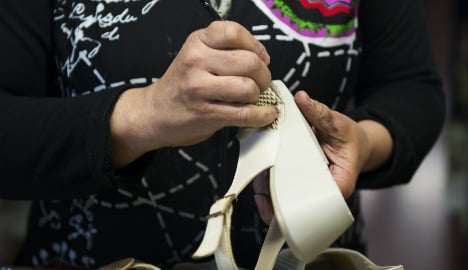Spain is the second-largest footwear producing country in the European Union after Italy, with 96.5 million pairs of shoes produced in 2013.
"Made in Spain" shoes are selling well at home and abroad but success comes in part thanks to some employees working off the books to help keep costs down.
The shoe sector "subscribes to the underground economy," said Jose Maria Mollinedo of Spain's tax inspectors union Gestha.
Up to half of Spain's shoe production is done in the underground economy, according to a study by students at Madrid's Autonomous University.
Over two-thirds of Spain's 1,400 footwear firms are concentrated in the Mediterranean coastal region of Valencia, with many clustered around Elche and the nearby town of Elda.
Spain's shoe industry rejects assembly line production, favouring instead semi-artisanal manufacturing by small and medium sized firms.

Big retailers such as Louboutin and Zara make some of their shoes in the country.
The sector's roughly 25,000 workers tap into a rich tradition of leather craftsmanship that dates back to the 19th century.
The industry had its golden age in the 1970s when US firms shifted their production to Spain, which was at the time isolated and less developed.
Like its European neighbours, Spain suffered in 2005 with the end of import quotas on shoes made in China.
But it managed to hold on to the production of mid to high-end shoes and the value of Spain's shoe exports hit a new record in 2013 of €2.64 billion ($2.83 billion).
– 'Always like this'-
But some of those prospering Spanish shoemakers are paying their workers off the books to avoid the taxman.
"I have always known it to be this way," said Manuel Molina, a 57-year-old leather cutter.
He recalls that his mother also worked in the industry making shoes at home and was paid in cash that was not declared to the tax office.
The practice is encouraged by the fact that certain tasks, such as cutting leather and cloth or sewing parts, can be done in small workshops or even athome instead of in a factory.
For women, it is a way to earn money while looking after their children at home.
Spain's economic downturn has increased the number of people willing to work in the shoe sector's underground economy, said Molina.
His six brothers and sisters, as well as his parents, are all working, or have worked, making shoes, he added.
The Spanish federation of footwear manufacturers FICE refused to comment on the topic, preferring instead to highlight rising exports to 170 nations.
Undeclared work in the shoe sector takes many forms, according to Carlos de Castro, a sociology professor at the Autonomous University who has studied the sector.
It could consist of seamstresses who work at home or men, often illegal immigrants, who load and unload trucks, he said.
Some companies only declare some of their employees to the taxman, while others outsource some or all of their production to clandestine workshops.
The practice angers unions as well as rival shoe firms that operate above board, who complain they are facing unfair competition.
"We can't compete with someone who does not pay their employees, who does not pay Social Security and whose production costs per pair of shoes is two or three euros less than ours," said Julian Mendez, a manager at Elche-based shoe firm Salvador Artesano.

Unions say their demands for work inspections at shoe firms have multiplied but they are often ignored.
"The state administration does not react," said Juan Antonio Macia of the Elche branch of the General Workers Union (UGT), Spain's second largest union.
– Young turned off –
Few workers in the underground economy, however, complain about their poor pay and working conditions out of fear of losing their jobs in a country with a sky-high 23.78 percent unemployment rate.
Conditions for workers with a contract are not rosy either. Salaries are low — between 963-1,060 euros per month before taxes — and temporary contracts that offer little job security are common.
"We are making shoes almost at the same price as in China," said Angel Cerda of the Elche branch of the Workers' Commissions (CCOO), Spain's largest union.
There is a risk that young people will steer clear of the shoe sector because of poor conditions and Spain's know-how will be lost, said de Castro.
"You learn the profession from your grandmother, from your mother and it is transmitted this way," he said.
Molina says he has always advised his twin son and daughter, aged 29, to "work, but not in the shoe sector".
By Laure Fillon / AFP



 Please whitelist us to continue reading.
Please whitelist us to continue reading.
Member comments